
Workplace design can make a big difference: Overall job satisfaction is strongly related to how efficiently office spaces are designed. According to Gartner, employees who feel good about their workplace are 16% more productive, 18% more likely to stay with their company, and 30% more likely to prefer their company over its competitors (report available to customers in English).
Small and midsize companies should rethink their space allocation and design workspaces to increase employee satisfaction. It’s not just worth it for the people-friendliness: productivity can also be boosted with satisfaction.
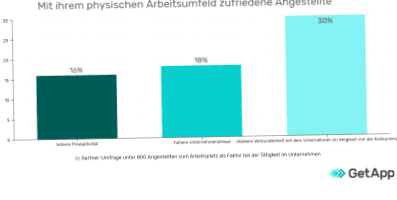
Agile workplace design for modern workflows
Agile workflows have taken the business world by storm. Breaking projects into smaller sub-projects, working iteratively, and focusing on flexibility and collaboration can increase innovation and productivity.
But companies also need a work environment that supports agile workflows – with a flexible layout, again divided into different areas that accommodate different ways of working and encourage collaboration.
Agile workplaces are highly networked environments that must meet the requirements of a wide variety of work styles. Agile work environments are designed with well-being at their core, and so they connect different types of areas together. Of course, the perfect office looks different for everyone. Companies should therefore offer solutions that avoid the disadvantages of traditional, constricting offices.
Today, many employees are used to coworking spaces and to common areas with WLAN being standard in all buildings. Modern offices are also less and less likely to consist of stuffy and boringly furnished business premises. They are increasingly becoming places where employees* are expected to feel comfortable and can move freely from one place to another.
Agile workplace design should strike a successful balance between private and public, personal and collaborative spaces. A mix of individual workstations, collaborative desk groups, various common areas, and quiet zones keeps work productivity high. This means that employees are free to choose which place suits them and their current project best at any given time.
As promising as it all sounds, companies that have relied entirely on open-plan offices often find that the investments they have made prevent them from switching to an entirely new office concept.
Fortunately, existing office spaces can also be effectively adapted using agile workplace design methods. This change may require a lot of creative ideas to make more efficient use of existing space, but the result is a multi-faceted workplace that increases productivity and makes almost everyone feel comfortable.
Design that fits any style
Every employee has a unique personality and a unique way of working. In this article, we want to simplistically group these different personalities into three work types and outline how they can benefit from agile workplace design:
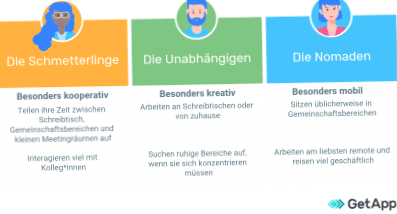
Agile workplace design must accommodate these preferences and provide the following options:
| Option | Addresses the following work types |
| Individual workstations | Butterflies, independents |
| Desk groups for collaboration | Butterflies, nomads |
| Small meeting rooms for 2-4 people | Butterflies, Nomads |
| Secluded quiet zones | Independent, Nomadic |
| Comfortable common areas | Butterflies, nomads |
| Remote work | Nomads, independents |
| Flexible working hours | Butterflies, independents, nomads |
| Cloud-based applications | Butterflies, independents, nomads |
4 ideas for agile workplace design
1. Hot desking: desk distribution on a first-come, first-served basis
Many growing companies are quickly running out of desks, although several remain empty each day because employees are traveling, taking vacation days or working from home offices. In agile workplace design, desks and seats are no longer permanently assigned, but each*person sits in a different place each day, which is much more efficient:
Employees come into the office, find a free space and get to work, much like in a coworking space. There are many advantages to this: For example, employees come into contact with more other employees* and get to know more of the rest of the company, plus less office space is needed overall. Like most elements of agile workplace design, hot desking is enabled by laptops, cloud-based applications and super-fast wifi.
Consumer goods company Unilever switched to a system of non-fixed workstations to increase collaboration, reduce office space and lower energy consumption.
2. Common areas, small meeting rooms and quiet zones
Making the most of previously idle space can make up for the drawbacks of conventionally designed offices. Agile workplaces need to include communal areas, quiet zones and small meeting rooms – also called huddle rooms.
Common areas
Most companies have a break room or kitchen, but common areas where you can relax with your laptop are less common. Such a common area could be a corner with cozy beanbags, a few sofas, or a bar with bar stools. Modular furniture that can be rearranged occasionally is ideal. Such areas encourage social interactions that bring employees closer together.
Quiet zones
Quiet zones provide a retreat for those employees who are easily distracted or simply need their peace and quiet for a while. These can be completely enclosed areas such as dedicated rooms or cubicles, but also separated work niches at desks similar to the unloved workstations in open-plan offices. In a busy open-plan office, however, such a work niche that allows for a bit of solitude can be a real boon: it provides the privacy needed for truly deep concentration.
Meeting rooms or. Huddle Rooms
Huddle rooms are small meeting rooms or areas for two to four people. Occasionally, they offer the necessary equipment for video conferencing and are overall ideal for spontaneous brainstorming or short meetings. Unlike large, formal conference rooms, whose use must be planned in advance, these rooms can be occupied spontaneously and without any reservation calendar.
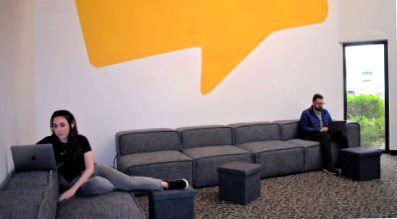
One of several common areas in the Software Advice office in Austin, Texas
3. Natural light instead of fluorescent tubes
A recent U.S. study shows that natural light and a view of the outdoors are the two things employees want most from their work environment – above all other extras and benefits. It’s also good for their health: research indicates that employees who work in naturally lit offices are 84% less likely to suffer from eye strain, blurred vision and headaches.
Unfortunately, in many companies, only upper management can enjoy natural light and views of the outdoors.
An agile workplace design democratizes natural light and window seats: Room layouts are modified to place common areas near windows whenever possible. Employees are especially likely to seek out these areas, further increasing the chances of chance encounters and spontaneous collaboration. Bright wall colors and glass partitions (rather than solid walls like typical cubicles) allow the natural light in each office to be used most effectively, benefiting everyone who works in it.
4. Remote working improves agile workplaces
The workweek is in flux: It’s increasingly less about strictly pulling off 9-to-5 rigid shifts and more about what comes out at the end of them. Employees are finding it easier to be productive and balance work with the rest of their lives at the same time. Many companies are placing less and less emphasis on knowing exactly when or where a job will get done, as long as it gets done.
Remote working models are also extremely popular among employees. The three main benefits employees see in remote working, according to a study, are more freedom, flexibility and productivity.
But remote work is also gaining popularity among employers because it allows them to cut costs. According to Gartner, the growing remote workforce will enable companies to employ 40% more employees by 2021 without increasing their footprint compared to today (Gartner report available to clients in English).
Flexible working hours and the option to work from home ensure that more desks are freed up and existing space can be used more efficiently.
As an example, consider an office with 50 employees that offers two different work schedules:
- 4 days | 10 hours a day | 1 day of remote work
- 5 days | 8 hours a day | 2 days of remote work
Combined with a hot desk model, this scenario can be scheduled so that only 30 out of 50 people are in the office on any given day, reducing the need for workstations by 40 percent. This means less space is needed for desks and more space is available for common areas.
Using guidelines and technology to achieve a successful result
For remote work policies and agile workplace design to be successfully implemented, the IT department must provide the appropriate technology. This includes laptops that are equipped with secure VPN access and a connection to the corporate WLAN. It’s also important to have policies that define how and through which devices employees can access corporate data, and what conditions exist for the use of personal devices on the corporate network. Typically, these aspects are established through BYOD policies, remote work policies and Acceptable Use Policies.
Another key step is to adopt cloud-based software, making distance irrelevant and eliminating the need to work from anywhere. Whether in the office, in a coffee shop, or on the other side of the world, all team members need to be able to access corporate data, share ideas, and collaborate in the same digital environment from anywhere.
Cloud-based project management tools for easier communication, activity tracking and scheduling are ideal for this purpose. Collaboration software like Samepage, for example, offers features such as to-do lists, real-time collaborative document editing, group video calls, scheduling and more through a central interface.
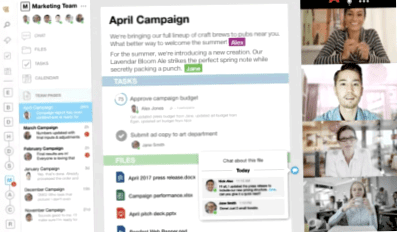
Samepage project management software (source)
When all these elements are properly combined, everything runs smoothly: flexible work schedules and remote work help companies use their offices more effectively, while laptops with the right cloud-based software allow teams to collaborate from anywhere.
Next steps
The shift to an agile workplace should be thoughtful and a deliberate process. Employees of younger generations are usually already very mobile and will quickly adapt to an agile office, while older employees are still more entrenched in conventional office concepts.
Explaining to employees exactly what benefits they and the company can expect will help ensure that they are positive about the change. With the introduction of popular options such as remote working, more controversial ideas such as hot desking can be offset.
It’s important to keep soliciting employee feedback and finding solutions to concerns. For example, if employees are uncomfortable with not having personal areas, they may be less uncomfortable if lockers are installed in common areas where they can safely store their belongings.
Workplace design also changes how we view work as a whole. When managers work directly with their subordinates, traditional hierarchies are overturned. No one works for a career anymore to finally get that corner office with a view; everyone has a different workspace every day – and they can enjoy the view out the window at any time.
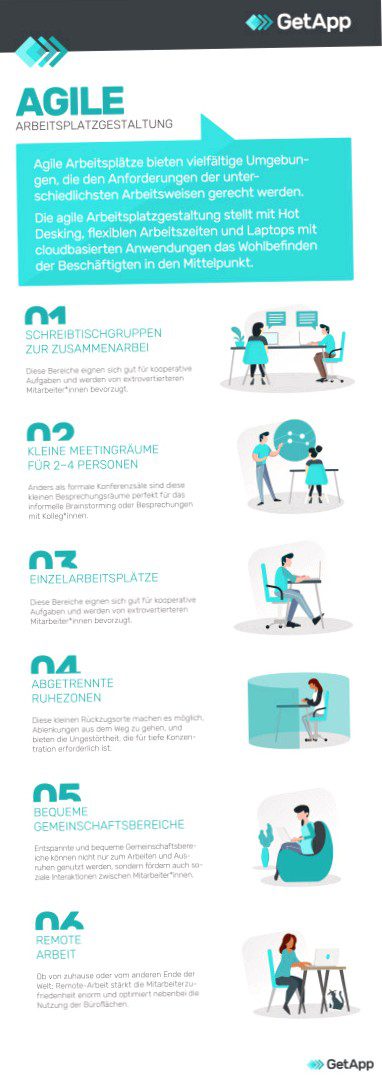
Note: The information in this article comes from sources we judge to be trustworthy. The selected applications serve as examples to present functions in context. This is not a recommendation.
This article may refer to products, programs, or services that are not available in your region or that may be restricted by the laws or regulations of your country. We recommend contacting the software vendor directly for information on product availability and legal compliance. Gender note: For better readability, the masculine form is used for personal names and personal nouns on this website. Appropriate terms generally apply to all genders in the spirit of equal treatment. The abbreviated form of speech is only for editorial reasons and does not imply any valuation.